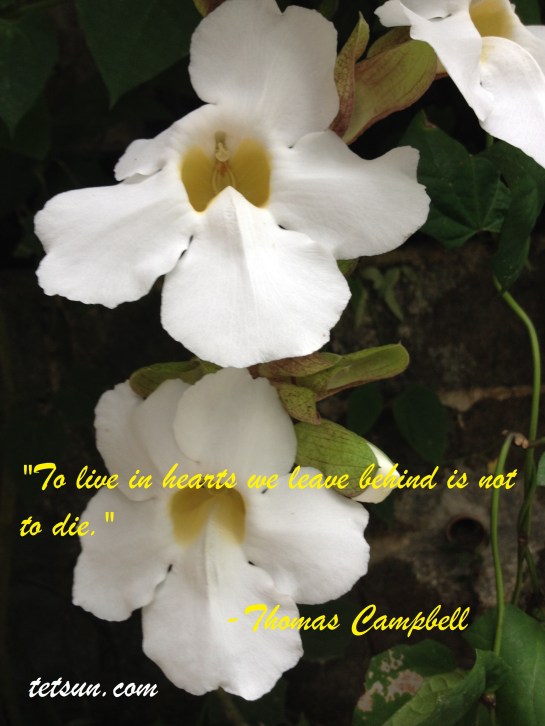
“To live in hearts we leave behind is not to die.” — Thomas Campbell
I am no longer a big Disney fan, but I watched “Coco” because I wanted to find another movie that my son can watch and enjoy watching. I absolutely loved this movie, not only for its story but for how close it is to my own culture. This movie reminds me again of how similar the Mexican and Philippine cultures are – having both Spanish and American influences. (And this in turn, reminds me of my trip to Canada last year where I met a young Mexican man at the airport in Vancouver. I had to call the travel agency, but my phone wouldn’t work. He offered to let me use his phone, even though we didn’t even know each other’s names. Later he sat next to me on the bus, and we talked all the way from Vancouver to Victoria like we’d known each other forever! It felt like I was talking to my own nephew!)
For an adult to enjoy this movie, one has to employ a willing suspension of disbelief – for example, there’s no need to question (like I did): before the invention of the camera, what was the requirement for the departed to be able to visit the living if they had no pictures in the ofrenda?!
In my hometown (I’m not sure if this true in all of the Philippines), when All Souls’ Day comes, people would write down on an envelope the names of their loved ones who had passed on, and put money inside and offer this to the altar during the Offertory part of the mass. The priest would then read the names of the departed, praying for their eternal repose. (When there are too many names to read, the priest would just say, “All the departed whose names are here on the altar” or something like that.)
One All Souls’ Day years ago, my mother couldn’t find an envelope to use for the offering. She was getting agitated. I finally found an Air Mail envelope with the red and blue stripes on the sides, and said, “Here, Ma, this will get to God faster!” She tried so hard not to laugh, believing it was blasphemous.
Also on All Souls’ Day, we fill our altar with the departed’s favorite things. Just like in “Coco.” I’m using the present tense “fill” because we (my sisters back home, and me here in China) still practice the same. But what we do prepare is nothing compared to what my grandparents did back in the day.
My grandparents had something like a prayer room. There was a big altar with several icons. At the center was that of Christ the King, and then that of St. Michael (the patron saint of my city) and the Immaculate Conception, Our Lady of Lourdes, Our Lady of Fatima, St. Joseph, etc. My grandfather had a big chair facing the altar where he would sit and pray the rosary in the evening. On All Souls’ Day, there would be different kinds of food, and drinks and tobacco or cigarettes. It was an exciting time for us kids back then because we looked forward to eating those sweets prepared for the dead. We were told to wait until the dead had seen them. To be honest, I can’t remember what time they said it was that the dead came to see the offering.
Since I moved to China, I would make a small altar made up of a cross and a candle on my father’s birthday and on All Souls’ Day. I’d “offer” a brownie or a slice of chocolate cake, a can of beer or a glass or rum, and a pack of cigarettes, and in the evening I’d drink the beer or rum (with coke though) and smoke a cigarette. These are the only times I smoke or drink. I’m allergic to alcohol, but I like remembering him this way. (My father only drunk on weekends after playing tennis. He didn’t drink on Sundays or weekdays because he didn’t want to be hungover at work.)
As my mother has also passed on, I now have two pictures on my altar.
Watching “Coco” made me realize that this practice of remembering the dead is rooted in the belief in the existence of purgatory and that the dead need help from the living for them to move on. I do no really think of heaven, hell or purgatory anymore unlike when I was a kid when I saw the cover of the Novena for the Souls in Purgatory.
So why do I still keep photographs of my dead parents and prepare an “offering”?
If I am to be honest, it is for selfish reasons – I miss them, and I do not want to ever forget them, and part of me wants to believe that somehow they can still see or hear me and help me when I have a burden that’s too much for me to carry.
It is very selfish and immature perhaps, but I think when you grew up having very protective parents, a part of you will always remain a child of your parents, looking up to them for guidance and protection. Just like Coco, who was already a great-great grandmother, yet still calling out for her Papa like a child (she might have had Alzheimer’s, but her memory of her father was not a false one.)
Can the dead see or hear? Will they know that the living even think of them? Perhaps not. But remembering the dead is not really for them to be taken out of purgatory and into heaven. It is for the living that theymay have the courage to live their lives the way their departed loved ones would have wanted them to do.



